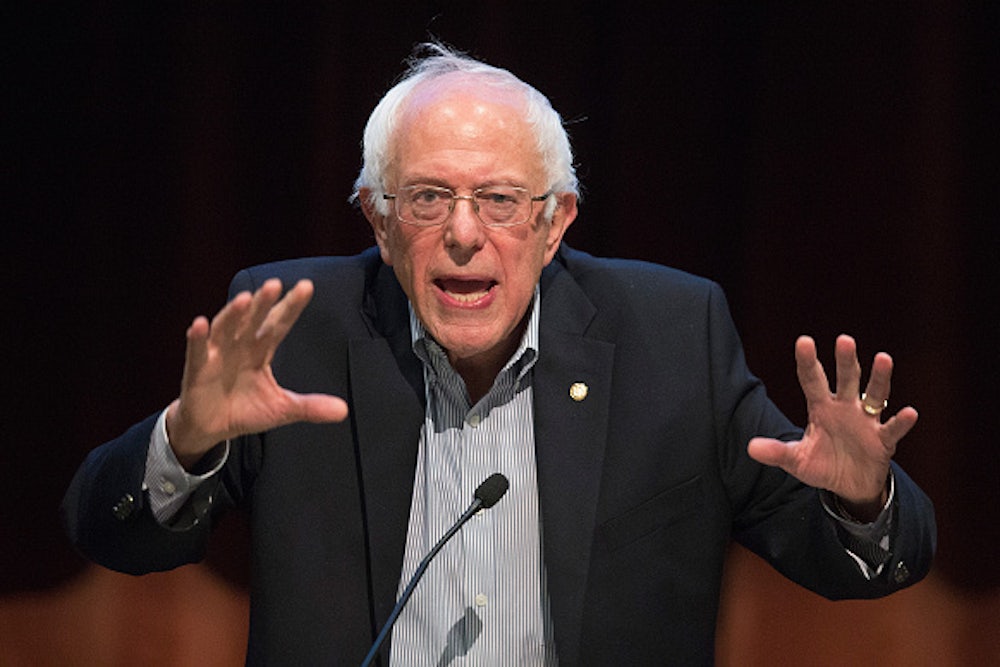As he prepares for the second Democratic Party debate, the most important questions Bernie Sanders has to ask himself are existential ones: What is the purpose of his campaign? Is it a symbolic crusade to raise the visibility of progressive economic issues and push the frontrunner Hillary Clinton to the left? Or is Sanders, as he and his campaign sometimes claim, “in it to win it,” and trying to become the Democratic Party’s nominee for the presidency.
Sanders claim that his goal is to “run to win” but his own actions belie that argument. Given his bold stance as a democratic socialist, and his often fiery rhetoric, Sanders has been far more successful than he might have hoped, but he still lags far behind Clinton. According to a recent Huffington Post poll, he sits at 31.7 percent, nearly 25 percentage points behind Hillary, who sits at 56.1 percent. Given Clinton’s formidable lead, Sanders’s only hope for actually winning involves convincing Hillary voters that they have to switch to him. And while he has turned somewhat more negative in the last month, it would entail running a far harsher campaign than Sanders has been willing to run so far.
During the first debate, it was noticeable that Sanders kept his speechmaking guns trained on Wall Street, but refused to make the plausible argument that Clinton is the candidate of big business. Sanders has also avoided playing up other potential weak areas for Clinton, such as her foreign policy hawkishness (which many in the Democratic base might be wary of) and also the character issues revealed in her handling of the email controversy that engulfed her. In fact, Sanders went to the other extreme, acting not as Clinton’s rival but as her advocate and protector. In the most memorable moment of the first debate he declared, “The American people are sick and tired of hearing about your damn emails.”
Hillary Clinton could hardly have asked for a better argument on her behalf than Sanders’s declaration that, “We have massive wealth and inequality. It’s cost us millions of decent jobs. The American people want to know whether we’re going to have a democracy as a as a result. Enough of the emails. Let’s talk about the real issues facing America.”
To judge by the first debate, Sanders wants to be the left wing of Clintonism, rather than a viable electoral alternative to Clinton within the Democratic Party. But given the excitement that his campaign has generated, which seems to surprise Sanders himself, he could try to win for real.
Eight years ago, another Democratic candidate for the presidential nomination faced the same dilemma that Sanders does today. Barack Obama enjoyed roughly the same level of popularity that Sanders does now, a passionate third of voters. Like Sanders today, Obama was loath to run a negative campaign and wanted to offer a more optimistic, constructive politics. But Obama and his staff realized that going after Hillary Clinton was the only road they had to the White House.
As Ryan Lizza reminds us in a recent New Yorker article, on October 11, 2007, Obama’s team composed a pivotal memo outlining Clinton’s weaknesses as a candidate and ways that Obama could position himself as a viable contrast. The memo is worth re-reading because much of what it said about how wide swaths of the public view Clinton remains true.
“HRC is driven by politics, not convictions,” it reads. “From the war, to NAFTA, to Social Security, to her choice of baseball teams, Clinton is constantly shifting, dodging and change her positions to satisfy the politics of the moment. Her penchant for secrecy and non-disclosure reflect an underlying disdain for the ‘invisible’ people for whom she claims to speak.”
The Obama campaign was so successful in playing up this perception of Clinton that it still governs how many Americans perceive her. It’s easy to imagine a Sanders campaign that had killer instincts taking the same tack, emphasizing the seemingly opportunistic way Clinton has flipped on Keystone pipeline and the Trans-Pacific Partnership, not to mention the simmering doubts about the emails.
Will Sanders go negative against Hillary Clinton, as he has to if he wants to win? If he does, it’ll be a sign that what started off as a symbolic campaign has, due to its unexpected popularity, turned into real run for victory.
